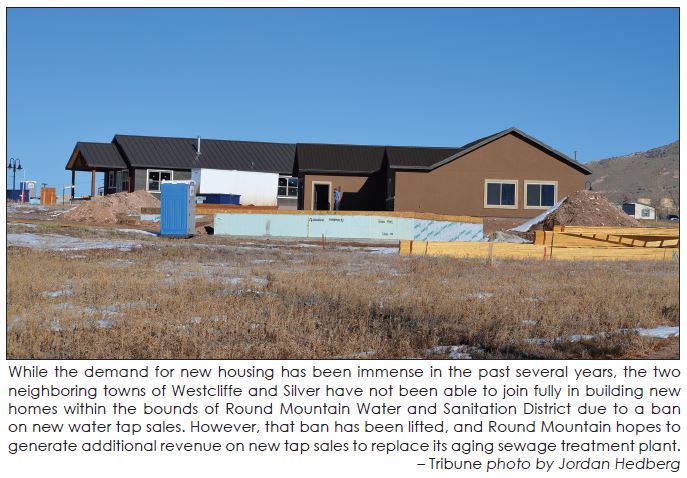At their last regular meeting of the year on December 21, the Board of the Round Mountain Water and Sanitation District (RMWSD) voted to lift the water tap moratorium imposed in 2022 as of January 1, 2024, following a positive report from District Manager Dave Schneider on his talks with consultants and the wastewater engineer at the Colorado Department of Public Health and Environment (CDPHE).
A letter issued by CDPHE earlier in the month rejecting the District’s proposal for a wastewater treatment pilot program led to an emergency meeting on December 14 to discuss options, including whether or not to lift the tap moratorium. The dilemma facing RMWSD was that without lifting the moratorium, the District does not have enough of an income stream to attract the kind of financing the new wastewater treatment plant would need. However, lifting the moratorium without some forward momentum on the plans for the new plant would potentially lead to terminal strain on the existing system.

Schneider reported that he and Board President Charles Bogle had met with the consultants Bogle had recommended at the December 14 meeting. “I can’t say any great divine inspiration came, but we got a little more clarity about what the state needs. I did talk to [CDPHE engineer] Dave Kurtz for over an hour about what he wants and needs – a lot of what he wanted aren’t actually requirements [for the pilot program] – his desire was to tell us that ‘if we want to do the pilot as a permanent solution, this is what we would need to do.’”
In short, what CDPHE wants to see is an amended demonstration project plan, or in effect, two pilot programs: one using the existing lagoon system, involving a thorough dredging, or “de-sludging” of the ponds, and then an optimized bio-agent mix, with the electro-coagulation system in the original proposal as a “Phase Two” pilot.

“We are going to have to de-sludge the ponds at some time – that needs to be done either way,” Schneider said, noting that the de-sludging, which hasn’t happened since 1991, would cost about $800,000.
“The good news about amending the plan and using the existing lagoons is that we don’t have to get another site approval done – we will be using the current site,” Schneider explained. (A new site approval plan would take up to a year and cost at least $500,000.)
“If the outcome is that if [the amended pilot project] goes reasonably well, we aren’t facing the expense we thought we were going to be?” asked Board member Mark Dembosky. “That’s right – I would recommend the Board to do an RFP for another engineering company that is into alternative technologies and wants to help us with this pilot project,” Schneider said.
“Is Dave Kurtz willing to put into writing what he told you yesterday?” asked Bogle. “He is willing to let us do an amended version of our [current] system,” Schneider replied: “He is much more comfortable with us using our existing system, which needs to be repaired anyway.”
“Does that approach compromise our financing?” was Bogle’s next question. “Probably not,” Schneider said, adding that the first phase of the project would likely cost about 1.5 million dollars. “Would that put it back in the realm of commercial financing?” Bogle asked. “Yes,” Schneider replied: “I would therefore recommend to the Board that we lift the moratorium – it will help out the towns and put money in our account.”
“My only concern was if we lifted it we would have to impose it again – I’m more encouraged after this report,” said Board member Randy Wilhelm.
“We never know what the future is going to hold, but lifting the tap moratorium doesn’t have as much to do with CDPHE as with fulfilling promises to towns and customer base,” Bogle said.
Board member Steve Laswell summed up: “Timing-wise we are looking at an RFP for an engineer to stamp and seal our plans for CDPHE, do a year’s worth of testing…with that approved based on good results, then we put in new systems. phase two is upgrading the system – and we believe improvements to the lagoons will enable us to deal with more taps being sold for the next two years?” “That’s right,” said Schneider.
“Do we give Dave our concurrence on proceeding with CDPHE while we pursue commercial financing?” Bogle asked. A motion to approve Resolution 2023-19, termination of the water tap moratorium established by Resolution 2021-12, passed unanimously. “We should start developing an RFP for a general contractor as well,” said Bogle.

In other business, the Board approved held a brief public hearing on Resolution 2023-18, authorizing amendments to the 2023 budget, which subsequently passed unanimously. The Board also discussed and approved Resolution 2023-20, amending rules and regulations to the effect that water taps shall not be subject to an expiration date for installation but also not subject to a refund, that contractor to contractor sales have to be approved by the Board, and that water taps have to be tied to a particular property in order to be sold.
Assistant District Manager Peggy Quint outlined policy changes in sending out delinquent account notices: “We were spending a lot of time and money on postage sending out second and third notices – let’s just send out one notice saying service will be disconnected after ten days. There will be an increase in tech time going out and shutting off water, but would improve our delinquent account collections. I did run this by our attorney, he says the policy looks good to him.”
“It moves the shut-off date up by a month, but if people make a contract to pay, then water service doesn’t get shut off?” asked Laswell. “Right,” said Quint: “We would like to start this the first of January.” Resolution 2023-21, authorizing the change in policy, passed unanimously, before the Board went into Executive Session at the end of the meeting.
– Elliot Jackson



